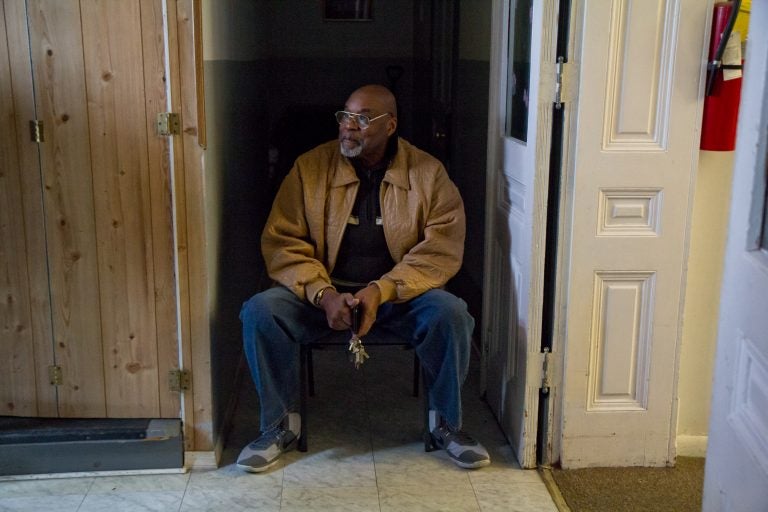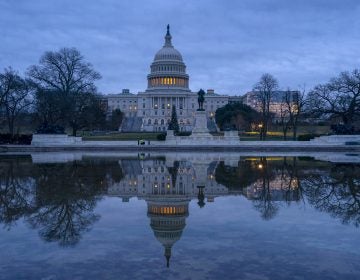Cost of shutdown in Pa. shows potential impact if it happens again
The most extensive effects would hit if a shutdown lasted 90 days.

St. James Chapel Church Pastor Steven McCracken is worried about the already struggling members of his community in Reading, Pennsylvania. (Kimberly Paynter/WHYY)
The federal government will be back in business for a few weeks following a 35-day shutdown.
But if lawmakers don’t strike a funding deal during that time, the shutdown could resume.
And we’ve learned that ramifications in Pennsylvania will be immediate – if limited.
Wider-spread effects seem like they would really start hitting after about 90 days, concentrated among some of our most vulnerable residents and communities, according to what Pennsylvania agencies told us about effects from the recent shutdown.
Federal government workers, who missed two paychecks, have been struggling, with nonprofits and private companies stepping up to help them with everything from utility bills to gym memberships.
Like a number of other states, Pa. waived work registration and search requirements for furloughed federal employees eligible for unemployment compensation.
But that didn’t help much for those who are declared essential and have to work without pay, because they can’t file for unemployment benefits.
Food banks went mobile to meet some of those federal employees where they are, at prisons and other job sites.
In Wayne County, state prison workers at Waymart collected money and essential supplies for their federal counterparts at the nearby U.S.Penitentiary Canaan, according to the Department of Corrections.
But Pa. has 14,200 federal employees in its workforce. Relative to population, that’s not too many compared to other states.
If the federal government were to shut down again, many more Pennsylvanians would stand to be affected if money for basic survival needs like food and shelter is compromised. Millions, potentially, depending on the funding source; all of them, really, if you consider the state might cover costs in lieu of federal dollars (and did, in some cases, over the past month or so).
PennDOT, for example, expects to be paid back. But the department covered more than $7 million in anticipated public transportation reimbursements that did not materialize during the recent shutdown.
Then there’s the Temporary Assistance for Needy Families program supporting about 130,000 low-income working Pennsylvanians by helping pay for services like child care.
TANF was among the programs being propped up by state loans to the tune of about $5 million, total, to keep them running.
Some stop-gaps would be a bigger ask, though.
Nearly 1.8 million Pennsylvanians, for example, get a combined $216 million per month in food stamps through the federal Supplemental Nutrition Assistance Program, according to Department of Human Services Secretary Teresa Miller.
Officials also say their concerns about problems arising before the money has even run out already were realized.
DHS, for example, paid out February benefits early, disseminating them last week.
Many households spent much of that money within days, apparently after being misinformed that it had to be spent by month’s end. Regardless of why, the development suggests families could go through SNAP funds — and food — before one might expect, Miller said, based on federal funding flows.
“We’re talking about children, older adults, and people with disabilities, primarily,” Miller said.
Some domestic violence survivors also rely on SNAP, Section 8 and WIC (Women, Infants and Children) funding, not to mention federal money that helps pay for shelters, counseling and other services, according to the Pennsylvania Coalition Against Domestic Violence.
Often, state agencies pass federal money to community service providers, and the specific impacts on those agencies really depend on their size, scope of functions and mix of funding sources. But smaller entities in rural areas would be disproportionately affected, according to PCADV spokeswoman Julie Bancroft.
Here’s a look at the federal shutdown’s effects on some other state departments and initiatives:
Pennsylvania Commission on Crime and Delinquency: Close to $100 million in federal funding has, in some years, flowed through PCCD to pay for criminal justice initiatives in communities across the state, according to this grant-tracking tool. Examples include public defender training, counseling for child and adult victims of crime, and developing re-entry plans for ex-offenders. It would become problematic for recipients about 90 days into a federal shutdown, according to PCCD officials.
Department of Labor and Industry: All told, at least 3,430 federal employees applied for unemployment benefits between the shutdown’s start on Dec. 22 and Thursday, Jan. 24. Just 335 workers applied during the same period last year, L&I said.
In addition to waiving the unemployment filing requirements, L&I’s Rapid Response Coordination Services have put on fairs in Pittsburgh and Philadelphia. Those entailed bringing together agency reps to feature potentially helpful resources from the state social services agencies.
Voting machine replacement: County officials must buy new voting machines in time for the 2020 elections, as per a state directive, and from companies that have completed certifications involving the federal Election Assistance Commission. A few vendors got through the process before the shutdown, but a couple others have been in limbo ever since, according to the County Commissioners Association of Pennsylvania.
Pennsylvania Emergency Management Agency: There has been some concern that weather forecasts aren’t as accurate during a long shutdown as they would be otherwise, given that PEMA and similar departments in other states rely pretty heavily on National Weather Service forecasts, and the agency has been significantly affected by the shutdown.
In addition, first responder and emergency management training with federal agencies was canceled during the shutdown, although activities related to last summer’s flooding disaster declaration were not impacted.
Department of Environmental Protection: Permitting operations slowed, which affected construction projects statewide. Some projects – including Superfund site cleanup and mine reclamation projects – halted completely. DEP also is still without EPA guidance on dealing with PFAS contamination in drinking water. Used in nonstick cookware and fire-fighting foam, the chemicals have been linked to illnesses, including cancer, and it’s unclear how exactly they affect human health and at what doses. And the state covered some expenses intended to be paid by federal EPA grants, according to DEP spokesman Neil Shader. StateImpact Pennsylvania had more on this here.
Department of Conservation and Natural Resources: Planes could’ve been grounded in mid-February instead of surveying 22 counties for data to inform flood management, natural resource management and conservation, land use planning, geologic mapping, and hazard reduction, and infrastructure development. Timing is important because the flights need to happen while trees don’t have any leaves. The aerial surveys are part of a study costing $3.3 million – some of which is federal money – and led by DCNR’s Bureau of Topographic and Geologic Survey.
Fish and Boat Commission: The FBC hasn’t been able to fully work on existing and potential future grants in the absence of staff and website updates from the Fish and Wildlife Service (Department of Interior), Forest Service (Department of Agriculture), National Oceanic and Atmospheric Administration (Department of Commerce), and Coast Guard (Homeland Security), Communications Director Michael Parker wrote in an email.
The grants pay for commission services such as consulting, technical advice, fish population surveys in Pennsylvania rivers and upgrades to fish hatcheries to meet federal Clean Water Act standards.
But the vast majority of federal funding wasn’t affected, and the commission had enough money on hand to pay researchers in lieu of salary reimbursements typically provided by the feds, according to Parker.
Office of the Attorney General: Similarly, the partial government shutdown didn’t directly impact the AG’s office, but made life difficult for officials at the FBI and other partner enforcement agencies.
State Police: Nothing major. One thing that came up was that, following 11 federal indictments in a triple homicide from 2016, investigators had to wait for a formal joint news conference on the matter with all agencies involved with the case.
Revenue: No direct effects, with tax season expected to proceed basically as usual, according to spokesman Jeff Johnson. People can file starting this week. Once that’s done, you can check the status of your return here.
Banking: Also nothing major, but the department encouraged banks to take steps such as waiving fees and reducing or suspending minimum payments for affected federal workers.
Department of Corrections: A grant to provide naloxone for recently-released prisoners could have been compromised if the shutdown had continued past March 1.
Department of General Service: There were some minor delays in delivering federal surplus equipment bought by local governments and state agencies through the fixed-price vehicle program.
Pennsylvania Housing Finance Agency: To help federal employees who weren’t being paid, the state-affiliated agency provided a one-time, interest-free advance for certain home loan payments that were due Jan. 1. The move helped 24 borrowers, according to PHFA spokesperson Scott Elliott.
Department of Military and Veterans Affairs: It gets federal money from the departments of Defense and Veterans Affairs, but they’re already fully funded through the 2019 fiscal year.
Administrative Office of Pennsylvania Courts, PASSHE, PUC, and the Turnpike and Game commissions, and the departments of Agriculture, Education and Insurance told our reporters that they haven’t been impacted.
The Pennsylvania Liquor Control Board and Juvenile Court Judges and Human Relations commissions didn’t respond to our inquiries.
—
Brett Sholtis, Marie Cusick, Rachel McDevitt, Ed Mahon, Min Xian, Avi Wolfman-Arent and Katie Meyer contributed to this report.
WHYY is your source for fact-based, in-depth journalism and information. As a nonprofit organization, we rely on financial support from readers like you. Please give today.





